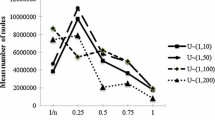Abstract
We consider a two-agent scheduling problem on a single machine, where the objective is to minimize the total completion time of the first agent with the restriction that the number of tardy jobs of the second agent cannot exceed a given number. It is reported in the literature that the complexity of this problem is still open. We show in this paper that this problem is NP-hard under high multiplicity encoding and can be solved in pseudo-polynomial time under binary encoding. When the first agent's objective is to minimize the total weighted completion time, we show that the problem is strongly NP-hard even when the number of tardy jobs of the second agent is restricted to be zero.
Similar content being viewed by others
References
Agnetis A, Mirchandani PB, Pacciarelli D, Pacifici A (2004) Scheduling problems with two competing agents. Oper Res 52:229–242
Clifford JJ, Posner ME (2001) Parallel scheduling with high multiplicity. Mathematical Programming, Ser. A, 89:359–383
Garey MR, Johnson DS (1979) Computers and intractability: a guide to the theory of NP-completeness. Freeman, San Francisco, CA
Hochbaum DS, Shamir R (1991) Strongly polynomial algorithms for the high multiplicity scheduling problem. Oper Res 39:648–653
Lawler EL (1977) A pseudopolynomial algorithm for sequencing jobs to minimize total tardiness. Annals Discr Math, 1:331–342
Moore JM (1968) An n job, one machine sequencing algorithm for minimizing the number of late jobs. Manag Sci 15:102–109
Rinnooy Kan AHG (1976) Machine scheduling problems. Martinus Nijhoff, The Hague
Author information
Authors and Affiliations
Rights and permissions
About this article
Cite this article
Ng, C.T., Cheng, T.C.E. & Yuan, J.J. A note on the complexity of the problem of two-agent scheduling on a single machine. J Comb Optim 12, 387–394 (2006). https://doi.org/10.1007/s10878-006-9001-0
Published:
Issue Date:
DOI: https://doi.org/10.1007/s10878-006-9001-0




